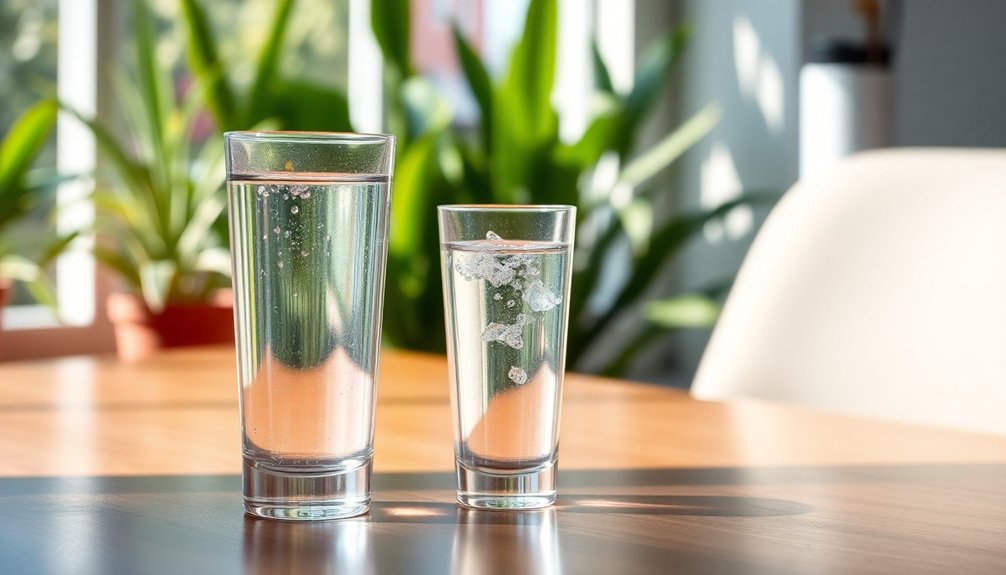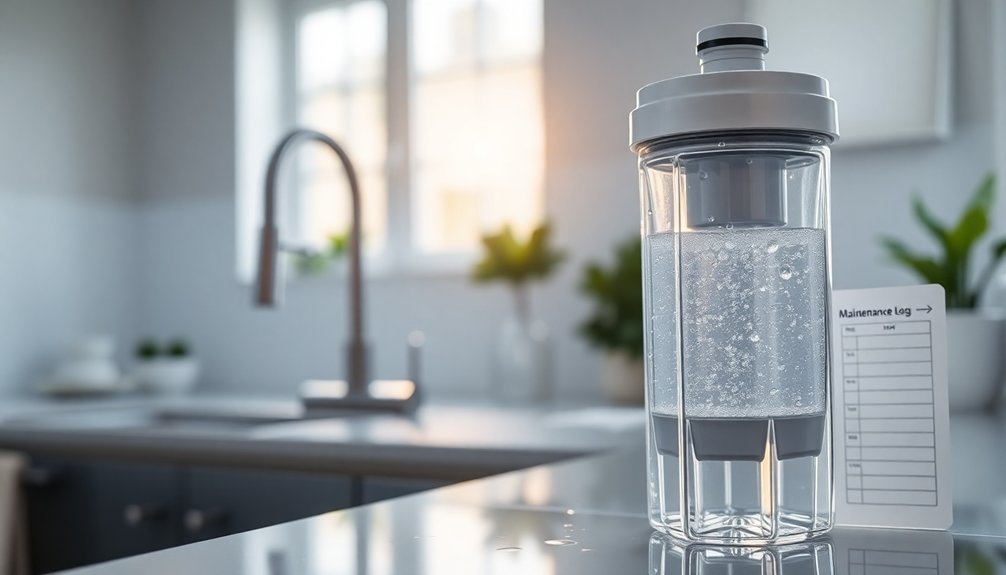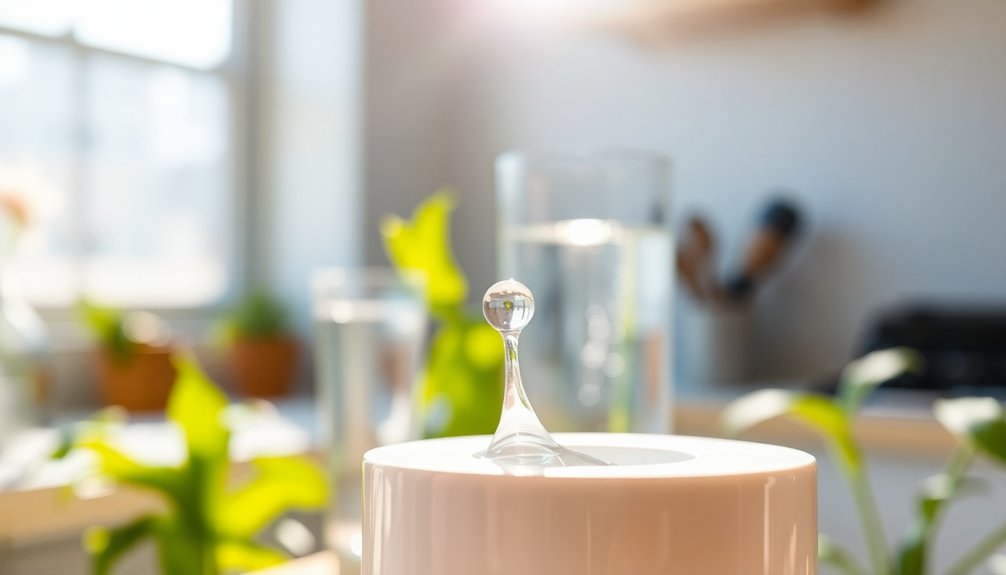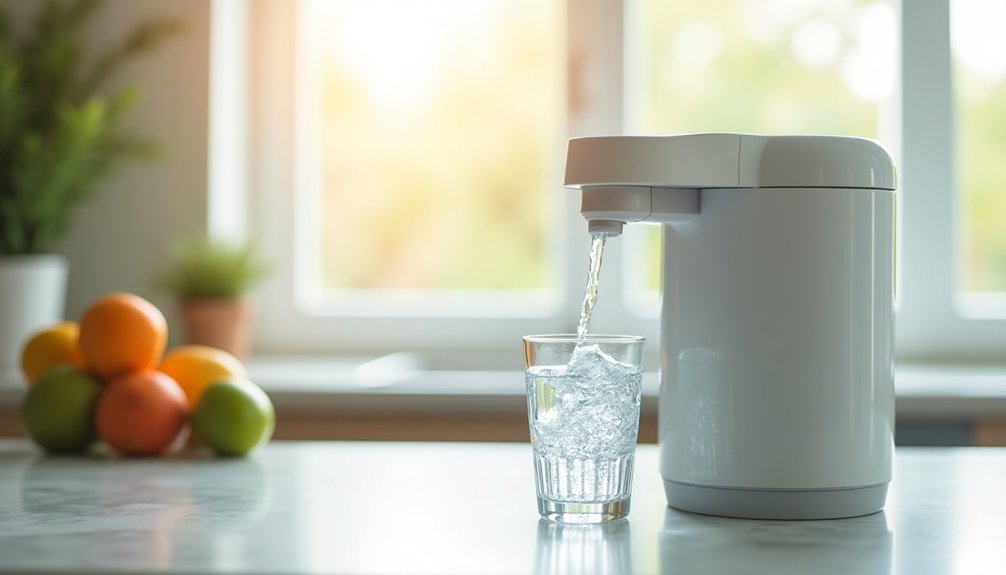Yes, polypropylene water filters are safe for ensuring clean and healthy drinking water. They carry NSF certifications, confirming they're lead-free and BPA-free. These filters efficiently remove contaminants like rust, sand, and bacteria, offering high particle removal rates and low leaching risks. Their lightweight and durable design makes them suitable for both residential and commercial use. With a lifespan of 3 to 6 months, they require minimal maintenance, making them user-friendly. You'll find they're a long-lasting solution for your water needs. If you want to know more about their benefits and maintenance, keep exploring!
Key Takeaways
- Polypropylene water filters are certified NSF/ANSI compliant, ensuring they are lead-free and BPA-free for safe drinking water.
- The material offers high chemical resistance, preventing harmful substances from leaching into filtered water.
- They effectively remove contaminants, including microbial pathogens, ensuring water safety and purity.
- Filters have a long lifespan of 3 to 6 months with proper maintenance, providing a cost-effective solution.
- Minimal maintenance is required, making them user-friendly while ensuring continuous filtration efficiency.
Understanding Polypropylene Material
Polypropylene, a versatile plastic, is widely recognized for its impressive physical and chemical properties. You'll find its density at 0.905 g/cm³, making it lightweight yet strong. With a melt temperature of 266°F (130°C) and a maximum recommended operating temperature of 180°F (82.2°C), it performs well under various conditions. Its flexural strength reaches 6000 PSI (41 MPa), showcasing its ability to endure pressure. Additionally, polypropylene's lightweight nature contributes to its popularity in various applications, including water filtration systems. The high chemical resistance of polypropylene also makes it ideal for environments where exposure to various substances is common.
Chemically, polypropylene exhibits robust stability. It resists many acids, bases, and solvents, although extreme strong acids and bases can pose a challenge. You'll appreciate its low moisture absorption, making it reliable for various applications. The thermal stability is commendable, but remember, it may melt or deform at high temperatures.
When it comes to mechanical strength, polypropylene shines with a tensile strength of 4700 PSI (32 MPa) and good impact resistance. It's relatively tough, allowing it to handle moderate impacts without breaking.
Furthermore, its filtration performance is noteworthy, providing a wide range of filtration accuracy from 0.5 μm to 100 μm, ensuring effective removal of pollutants while maintaining high flow rates. In short, polypropylene is a strong and resilient material for water filtration.
Safety Standards and Certifications
When choosing polypropylene water filters, you should pay attention to certifications like NSF. These certifications not only assure that the filter is lead-free and BPA-free, but they also guarantee the removal of harmful substances from your water. Checking for the NSF seal on the product will help you ensure you're getting a safe and effective filter. Additionally, polypropylene water filters are known for their ability to remove large particles and contaminants, further enhancing the safety of your drinking water. It is important to note that while polypropylene filters may be effective, certain plastic coding systems can indicate potential safety risks associated with chemical leaching.
NSF Certification Importance
Ensuring the safety and quality of water filters is crucial, and NSF certification plays a vital role in this process. When you're choosing a water filter, it's important to look for this certification, as it signifies that the product has undergone rigorous testing.
Here are three key aspects of NSF certification:
- Material Safety: NSF ensures that the materials used in the filter won't leach harmful substances into your water. This includes independent testing and compliance with safety standards. Additionally, NSF certification is recognized as the gold standard by regulatory agencies and health departments.
- Structural Integrity: The certification process includes durability testing to confirm that the filter can withstand normal usage conditions. This guarantees long-term reliability and adherence to safety regulations.
- Contaminant Reduction: NSF verifies that filters can effectively reduce specific contaminants, including health-related issues like lead and VOCs. This ensures that your water meets health standards and tastes great.
Lead-Free Assurance
Lead-free assurance is essential for safe drinking water, particularly in homes and schools. To ensure that the water you drink is free from harmful lead levels, look for filters certified under NSF/ANSI Standard 53. This certification guarantees the filter can effectively reduce lead from your water supply. Manufacturers voluntarily submit products for independent testing by NSF International, which evaluates their performance rigorously.
Polypropylene water filters receive NSF 372 certification, confirming they're lead-free and BPA-free. Made from safe materials, these filters handle various water conditions and reduce multiple contaminants, including lead. They feature multiple layers designed to trap particles and sediments, extending their service life and enhancing their purification capabilities. Point-of-Use treatment systems are particularly effective for ensuring that lead is reduced at the tap where water is consumed.
In schools, using certified filters is crucial to prevent lead contamination. Lead testing can be inconsistent, so relying on certified filters that ensure lead levels remain below the 1 ppb recommended limit is vital.
When you shop for filters, always check for the NSF mark and confirm their certification status, ensuring your drinking water remains clean and safe. Continuous monitoring and using certified filters are essential steps to protect your health and that of your family or students.
Filtration Performance Overview

When it comes to filtration performance, you'll find that polypropylene filters excel in particle removal efficiency. Their multi-layer design allows them to capture a range of contaminants effectively, ensuring your water stays clean. This combination of features makes them a reliable choice for various filtration needs. Additionally, their high chemical resistance ensures that they maintain integrity against a wide range of contaminants, further enhancing their filtration capabilities. Furthermore, polypropylene is known for its low risk of leaching, which helps ensure that harmful chemicals do not compromise the safety of filtered water.
Particle Removal Efficiency
Polypropylene water filters stand out for their remarkable particle removal efficiency, effectively tackling a range of contaminants. You'll find that these filters can significantly enhance your water quality by removing various particles, ensuring cleaner drinking water.
Here's what makes polypropylene filters so effective:
- High Particle Removal Rate: They can reduce up to 99% of sediment, sand, and rust, providing you with clear water.
- Versatile Filtration Mechanisms: Utilizing both straining and adsorption, these filters efficiently capture fine particles, adapting to different filtration needs with various micron ratings.
- Long Lifespan: With proper maintenance, polypropylene filters maintain their filtration performance over time, making them a cost-effective solution.
Moreover, their chemical resistance allows them to function in diverse water conditions, whether hot or cold. Additionally, their effectiveness in removing iron particles enhances overall water safety and quality, making them an essential component of household water purification systems.
You'll appreciate the consistent flow rate they offer, ensuring a reliable supply of filtered water. Whether you're concerned about microbial pathogens or disinfection by-products, polypropylene filters show proven effectiveness, making them a strong choice for safeguarding your drinking water.
Multi-layer Filter Design
Multi-layer filter designs significantly enhance filtration performance by effectively capturing a wide range of contaminants. With multiple layers, these polypropylene sediment filters work from the inside out, ensuring high filtration efficiency. You can choose from various micron ratings, from 0.2 to 100 µm, to meet your specific needs. The increased surface area in these filters allows for better dirt retention and higher throughput.
These filters also offer both absolute and nominal efficiency, meaning contaminants are removed regardless of size. Their robust construction, thermally welded for durability, withstands various chemicals without degrading, making them suitable for diverse applications. Most filters meet NSF health safety standards, ensuring they're safe for water treatment. Additionally, these cartridges are constructed entirely from polypropylene material, which contributes to their durability and effectiveness in filtration.
You'll appreciate the long service life of these cartridges, designed with a 30% longer filtration lifespan thanks to their three-layer density. With a sediment reduction rate exceeding 99%, they maintain consistent performance while minimizing fiber release.
Available in multiple sizes and configurations, these filters easily integrate into your existing systems or can be customized for specific filtration requirements, providing great versatility in your water treatment solutions.
Applications and Usability
- Industrial Use: In food and beverage, they filter contaminants during processing. They're also vital in petrochemical and chemical industries, ensuring purity in solutions and waste management.
- Residential Solutions: At home, you can use them in whole-house filtration systems or under-sink filters to keep your tap water clean. They work great with UV purifiers and reverse osmosis systems, enhancing your water quality.
- Specialized Applications: Polypropylene filters are essential in the pharmaceutical and cosmetic industries, removing impurities from products. They even play a role in electronic manufacturing, ensuring components remain clean. Additionally, these filters can be utilized in plastic greenhouses to ensure that water used for irrigation is free from harmful contaminants.
Lifespan and Maintenance Needs

Maximizing the lifespan of your water filter is essential for maintaining clean and safe drinking water. Polypropylene water filters, like the PUREPLUS PP Spun and Waterdrop TSPP models, can last anywhere from 3 to 6 months, depending on usage and water quality. To ensure optimal performance, regular maintenance is key.
Here's a quick overview of lifespan factors and maintenance needs:
| Aspect | Details |
|---|---|
| Filter Life Expectancy | 3-6 months or 30,000 gallons, based on quality |
| Maintenance Frequency | Replace filters based on use; annual sanitization |
| Signs for Replacement | Decreased efficiency, flow issues, unwanted tastes |
Replace filters as recommended by the manufacturer to avoid pollutant buildup. Regularly clean and inspect your system to catch any leaks or wear. Monitoring the flow rate and checking for signs of damage will also help in maintaining your filter's effectiveness. Remember, maintaining your polypropylene filter not only extends its life but also ensures you're drinking the cleanest water possible. Additionally, understanding the environmental impact of plastic pollution can encourage consumers to adopt more sustainable practices in their daily lives.
Additional Advantages of Polypropylene
While maintaining your polypropylene water filter is important for longevity, it's equally valuable to recognize the many advantages these filters offer. They stand out for their efficiency and versatility, providing clean water for various needs.
Here are three key benefits:
- High Efficiency Filtration: Polypropylene filters effectively remove contaminants like rust, sand, and bacteria, ensuring your water remains clean. They've a high dirt-holding capacity, which means you won't have to replace them as often.
- Chemical Resistance and Durability: These filters resist a wide range of chemicals and can withstand both hot and cold water, making them ideal for diverse environments. Their durability ensures long-term performance without degradation.
- Versatility in Applications: Polypropylene filters fit a variety of filtration systems, whether for residential or commercial use. With different sizes and micron ratings available, you can customize them to meet specific filtration needs, including pre-treatment and post-treatment stages. Moreover, their high chemical resistance allows for effective use in various applications, ensuring safety and efficiency.
Addressing Common Concerns

Concerns about safety, filtration performance, maintenance, and environmental impact often arise when considering polypropylene water filters. You'll be pleased to know that polypropylene is a non-toxic material, safe for handling various water conditions, and meets NSF health safety standards.
These filters are lead-free and BPA-free, ensuring your drinking water remains uncontaminated.
When it comes to filtration performance, polypropylene filters effectively remove suspended solids, rust, sand, and even bacteria. Their multi-layer construction enhances contaminant interception, ensuring a long service life with high dirt-holding capacity and a high flow rate.
Maintenance is straightforward; these filters require minimal effort to clean and can be rinsed or backwashed easily. Their durability means they withstand rigorous water treatment processes, making them suitable for both home and industrial use.
Finally, consider the environmental impact. Polypropylene filters are recyclable and free from harmful additives, aligning with a sustainable approach to water treatment. Additionally, polypropylene is classified as plastic #5, indicating lower toxicity compared to many other plastics.
Frequently Asked Questions
Can Polypropylene Filters Remove Viruses and Bacteria Effectively?
Yes, polypropylene filters can effectively remove viruses and bacteria, especially when combined with UV disinfection systems. They capture small particles, enhancing overall water quality and ensuring safer drinking water for you and your family.
How Often Should Polypropylene Filters Be Replaced?
You should replace polypropylene filters every 3 to 6 months, or sooner if your water's particularly dirty. Regular maintenance, like cleaning and inspecting for clogs, helps ensure your filter remains effective and safe.
Are Polypropylene Filters Suitable for Well Water?
Yes, polypropylene filters are suitable for well water. They effectively remove sediments and contaminants, ensuring your water stays clean. Just remember to maintain and replace them regularly for optimal performance and safety.
Do Polypropylene Filters Affect Water Taste?
Polypropylene filters can significantly improve water taste by removing contaminants like sediment and chlorine. You'll notice a cleaner, fresher flavor after using them, especially if you maintain the filters regularly to prevent bacterial growth.
Can Polypropylene Filters Handle High Levels of Sediment?
Yes, polypropylene filters can handle high levels of sediment. Their multi-layer construction effectively removes large particles, boasting a high dirt-holding capacity that minimizes clogging and extends the filter's lifespan for optimal performance.

